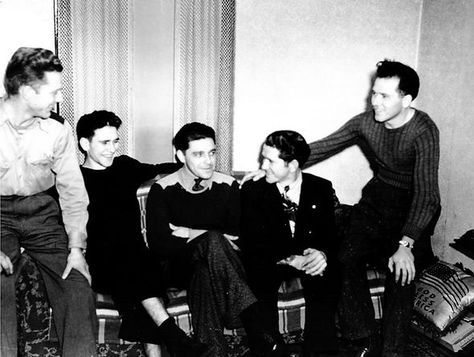Sullivan Family History
It was on Nov. 13, 1942, that a Japanese submarine torpedoed the USS Juneau during World War II's Battle of Guadalcanal. Most of the sailors aboard were killed, including the five Sullivan brothers from Iowa. The heavily-damaged naval cruiser sank so quickly in the Pacific Ocean, and the risk of further attack was so great, that rescue efforts didn't begin for a number of days. In all, the Juneau suffered 687 casualties and just 10 survivors.
Although it was Navy policy to separate brothers, the Sullivans of Waterloo — George, Frank, Joe, Matt and Al — enlisted in January 1942 with the provision that they stay together.
In Honor and Remembrance of The Five Sullivans Brothers
George Thomas, 27; Francis "Frank" Henry, 26; Joseph "Joe" Eugene 24; Madison "Matt" Abel, 23; and Albert "Al" Leo were the five sons of Thomas and Alleta and the brother of Genevieve Marie. Another sister, Kathleen Mae, died in infancy.
The Irish-American family was from Waterloo and was connected to the former St. Mary’s Catholic Church.
George and Frank had already served in the Navy, and were discharged in 1941, before all five brothers decided to enlist. They did so — under the condition that they be allowed to serve together — on Jan. 3, 1942, about a month after the bombing of Pearl Harbor, in which a friend of theirs, Bill Ball of Fredericksburg, was killed along with more than 2,400 others.
Witnesses of the Juneau's attack said three of the brothers died instantly when the ship exploded and sunk, and that one drowned the next day. Another, who was badly wounded, was able to climb aboard a life raft and survived four or five days before slipping into shark-infested waters, the Register has reported.
Thomas Sullivan, who was an Illinois Central freight conductor, and his wife held out hope for their sons' survival months after the attack.
Official news that the five brothers were missing in action, and condolences from the Navy, came on the morning of Jan. 12, 1943, as Thomas Sullivan was getting ready for work.
Sullivan heard a car stop outside their home, according to a story in the Jan. 16, 1943, Des Moines Register. Then there were footsteps on the porch and a knock. As he opened the door he saw gold braid and blue uniforms.
"I knew then what we were going to hear," he said.
Thomas Sullivan reported to work at 7:45 a.m. that day, just 30 minutes after receiving word.
"Sometimes a man can keep from thinking about it as he works," he told the Register.
According to a story in the Jan. 12, 1943, Des Moines Tribune: High naval personnel officials at Washington, D.C., said the loss of the five brothers ranked as "the heaviest blow suffered by any single family since Pearl Harbor and, probably, in American naval history."
Officials at the time pointed out that the presence of the five brothers aboard the Juneau was "at the insistence of the Sullivans, in contradiction to repeated recommendations from the ship's executive officer."
Riders to the sea, and alien to the corn,
They went to the death for which they were born.
Not at all Gothic in the Grant Wood style;
Just Iowa Irish, with a lurking smile.
They rose up early in their dawn of life,
The blood-beat pounding at the call of strife,
Deeming it better for themselves to die
Than have the light fade from an Iowa sky;
The light that drew them before they were born
To the middle border and the fields of corn.
Iowa Irish, with a grand old name;
Push over, John L., you have had your fame.
For here is a breed that's Iowa bred;
Push over, John L., and bow your head.
These Sullivans came in the Midwest stream;
These Sullivans died for the American dream.




